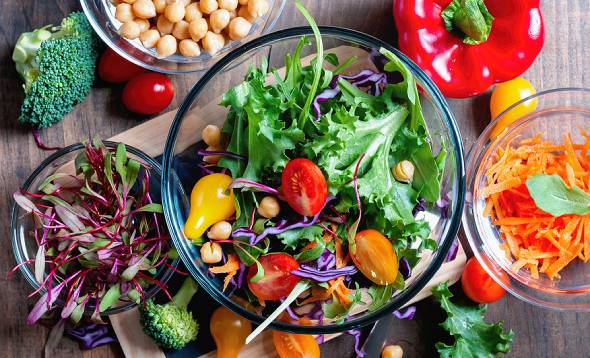That organic living is a conscious health choice
Which Plant-based Diet is For You?
There’s been a growing shift towards plant-based eating in the recent years. With Meatless Mondays to the proliferation of alternative meats and game-changing documentaries on plant-based diets, people are becoming more aware of the meat-free movement and the available alternatives.
The reasons behind this global movement range from environmental and ethical concerns, to religious and health motivations.
Regardless of your intent, the great thing about plant-based diets is that there are many ways to go about it – and it doesn’t have to be all or nothing. Unlike diet trends that slap on a ton of restrictions on what you can or cannot eat, plant-based eating allows for customisation based on your level of commitment, lifestyle, health status, etc.
Vegan, vegetarian, pescatarian and flexitarian - with so many different approaches, which is the best for you? If you’re looking to jump onto the plant-based bandwagon, here’s an overview of each approach - along with key nutritional considerations - to help you ease into this heart-healthy diet:
VEGAN
What this diet entails:
Vegans avoid all foods of animal origin such as meat, seafood, eggs and dairy. However, it also includes often overlooked animal-derived ingredients like honey and other hidden additives, such as albumin, casein, pepsin, whey and gelatin, which are commonly used in marshmallows, cereals, candies, gum, as well as certain beers and wines. To follow this regimen to the letter, reading labels is essential and perhaps even checking with brands about their manufacturing processes.
Nutrition focus areas:
- Protein: Compared to foods from animals, plant foods are far less concentrated in protein and few contain all the essential amino acids. Vegans need to plan their meals well to include ample and diverse plant-based proteins.
- EPA and DHA: Fish are the foremost whole food source of these two essential omega-3 fatty acids. The only fish-free sources for vegans are seaweeds and marine algae - such as spirulina and chlorella - which contain only small amounts. It’s possible for the body to convert ALA - a third omega-3 found in plant-based foods including almonds, walnuts, flax and chia seeds - into DHA and EPA. However, as this process isn’t especially efficient, vegans often rely on supplements formulated from microalgae to cover their DHA and EPA needs.
- Micronutrients:
Vitamin B12 – This vitamin is only naturally found in animal foods. Aside from nutritional yeast and fortified foods like cereals and plant-based milk beverages, there are no other vegan sources. To ensure they’re getting adequate amounts, many vegans rely on vitamin B12 supplements.
Iron & Calcium – The former is richest in red meat while the latter is most abundant in dairy. While green vegetables, beans, whole grains, tofu, nuts, seeds and fortified foods offer these two minerals, they are far less concentrated and bioavailable. So, vegans often need to consume these regularly and in larger quantities to meet the recommended daily requirements.
SuperNature recommends:
Minami Nutrition Vegan DHA EU, 60 Caps
An easy way to meet the body’s daily requirement of essential omega-3 fatty acids, this supplement offers vegans and vegetarians a plant-based source of DHA to maintain optimal brain function and vision.
Vego Organic Whole Hazelnut Chocolate Bar, 150g
A pure treat for the tastebuds, here’s a sweet delight that vegans can enjoy. Vegan-friendly and gluten-free, this luscious chocolate bar is carefully crafted with all organic and Fair Trade-certified ingredients for a deliciously guilt-free indulgence.
VEGETARIAN
What this diet entails:
Vegetarianism is the practice of abstaining from eating any form of animal flesh. However, there are many variations of vegetarian diets. Those who choose to eat eggs and dairy are called lacto-ovo vegetarians. Vegetarians that opt to take dairy are known as lacto-vegetarians while ovo-vegetarians refer to those who include eggs in their diet.
Nutrition focus areas:
Nutritionally speaking, the vegetarian route makes it a little easier to satisfy some nutritional needs. By allowing the intake of some animal-based foods, the body has more access to ‘complete’ protein and vitamin B12. That said, dairy and egg aren’t nearly as dense in total protein as meat, poultry or seafood. So, vegetarians will still need to remain diligent with their diets to ensure their meals are able to fulfill their overall daily protein needs. If dairy is permitted, calcium needs are far more easily met. However, without meat and fish, sufficient intake of iron and essential omega-3 fatty acids may remain as a bit of a challenge.
SuperNature recommends:
Just Egg Plant-based Scramble, 355ml
Free of cholesterol, Just Egg Plant-based Scramble is a healthful alternative to eggs. Great as scramble on warm buttered toast, it’s equally delicious in fried rice or casseroles.
Daiya Medium Cheddar Style Farmhouse Block, 200g
One bite and you’ll see why this is a fan favourite. With its rich cheddar flavour and melty, gooey texture of real cheddar cheese, it makes for the perfect alternative in macaroni and cheese, nachos or any other comfort foods you crave.
PESCATARIAN
What this diet entails:
Pescatarian describes those who abstain from eating all meat and animal flesh except for fish and shellfish, such as prawns, clams, crabs and lobsters. While individuals may vary in their personal practices, pescatarians – like vegetarians – often include eggs and dairy in their diets.
Nutrition focus areas:
With the inclusion of fish and shellfish, a pescatarian regime further reduces the risk of running low in complete sources of protein, vitamin B12 as well as as omega-3 fatty acids, DHA and EPA, as these are abound in cold-water fish. However, without red meat and darker cuts of poultry, pescatarians still need to keep an eye on their iron intake.
FLEXITARIAN
What this diet entails:
As its name suggests, flexitarian is the most flexible of the lot. Rather than omitting anything completely, this diet is largely vegetarian but allows for the occasional meal with meat and poultry. Meat eating frequency depends on the preference of the person, but the aim is to keep it to an overall minimum.
Nutrition focus areas:
Since this diet is the least restrictive, the likelihood of deficiency declines significantly. Instead, the focus becomes how to draw from the benefits of plant-based eating as much as possible while still dabbling in omnivorous eating from time to time.


























_1672804154.jpg)

_1611290459.jpg)